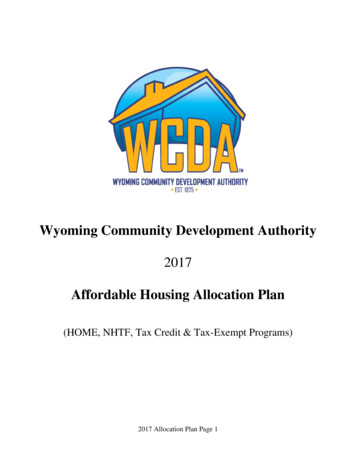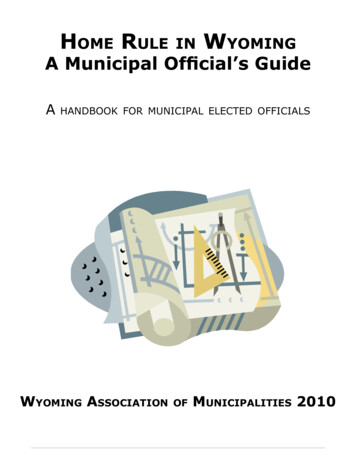
Transcription
Home RuleinWyomingA Municipal Official’s GuideAhandbook for municipal elected officialsWyoming AssociationofMunicipalities 2010
“A local government needs from the central government, the state,nothing but adequate power to exercise the functions of local government.”——Horace E. Deming, The Government of American Cities, 1909This brochure was prepared by the Leadership Training Services Board under contract withCommunity Builders, Inc. a Wyoming-based consulting firm Bobbe Fitzhugh and Joe Coyne, principals - www.consultCBI.comWyoming Association of Municipalities
Home RuleinWyomingMunicipal Official’s GuideContentsWhat is a “Municipal Government” and where does it get its power.2How are municipalities created.2What does Home Rule really mean.3What was the Home Rule standard prior to the 1972 WyomingConstitutional Amendment.4What does the Constitutional Amendment on Home Rule Say.5The mandate for Home Rule.5What can Home Rule do.6What does Home Rule not do.7What is a Charter Ordinance.7What is the bottom line on Home Rule.81Home Rule in Wyoming
Whatwhere“Municipal Government”does it get its power?is aThe Constitution of the United Statesof America does not mention localgovernments. They are created and regulatedby the states. One would like to think thatstate governments would readily delegateauthority and responsibility for powers andfunctions not within its jurisdiction to localmunicipal governments - the governmentclosest to the people. Unfortunately, thestruggle for this concept of “home rule” hasnot been that simple or clear-cut. WhileWyoming municipal government earned thelegal right to exercise home rule through aconstitutional amendment passed in 1972,fully defining the concept in Wyominghas been a continual struggle. To betterunderstand the evolution of “home rule”in Wyoming, a review of the nature of thiscreature called “local government” is helpful.andsolicitation, consent orconcurrent action of thepeople who inhabit them.Like private corporations, municipalcorporations can own property, enter intocontracts, and incur debt. The ownersof a corporation (the citizens), give theresponsibility of running the corporation(the municipality) to a board of directors (thetown or city council). The council acts onbehalf of the citizen owners in deciding whatthe municipality should do.Municipal corporations differ from privatecorporations in important ways. Forone thing, citizens become “owners” of amunicipal corporation simply by livingwithin the municipality’s jurisdiction.Municipal corporations also have differentHow Are Municipalitiespowers than private corporations. PrivateCreated?corporations can engage in any legal activitythey choose. Prior to 1972, WyomingState governments establish cities and towns municipalities could engage in only thoseas municipal corporations by enacting general activities which the State of Wyominglegislation (hence the term “incorporatedhad delegated to them. By constitutionalmunicipality”). Municipal corporations come amendment, approved by the voters andinto existence either at the direct request of,effective on December 12, 1972, local selfor by the consent of, the citizens residing ingovernment authority, known as “home rule”them – they develop from the people.was granted to Wyoming cities and towns butthat self-governance maintained a number ofCounties, on the other hand, are created bykey restrictions which will be discussed.the sovereign power of the State without theWyoming Association of Municipalities2
Whatreally“Home Rule”mean?doesThe concept of home rule can be tracedto the Tenth Amendment of the U.S.Constitution, providing that states and theAmerican people themselves retain all powersnot granted to the federal government.Black’s Law Dictionary defines home ruleas a “state or constitutional provision ortype of legislative action which results inapportioning power between state and localgovernments by providing local cities andtowns with a measure of self government ifsuch local government accepts terms of thestate legislation.” (Black’s 1990, 733).Simply put, home rule is the delegationof power from the state to its sub-unitsof government (including counties,municipalities, towns, etc.). That power islimited to specific fields, and is subject toconstant judicial interpretation.There are four primary areas in which“home rule” powers are exercised bygovernments: Structural – power to choose the formof government, charter and enact charterrevisions;Simply put, home rule is the delegationof power from the stateto its sub-units of government. Personnel – authority to set employmentrules and conditions ranging fromremuneration to collective bargaining.Home rule, observes political scientistRodney L. Mott, serves three objectives:1. It grants local governments the power andflexibility to satisfy increasing demands forlocal services;2. It permits local governments to determinethe kind of government best suited to theirneeds; and3. It usually protects local governmentsfrom state intervention, while protectingthe state from the constant pressures of localgovernments for additional power to respondto new challenges (Mott, 1949, 1112). Functional – power to exercise powers oflocal self government; sometimes qualified as“broad functional” or, Fiscal – authority to determine revenuesources, set tax rates, borrow funds, andother related activities; and3Home Rule in Wyoming
What was the Home Rule standardConstitutional Amendment?prior to the1972 WyomingDillon’s Rule, named after Justice F. Dillonof the Iowa Supreme court, was the 19thCentury precursor to Home Rule. Dillon’sposition treated cities and towns of a stateas those of children connected to a parent.The first part of Dillon’s Rule states that localgovernments have only three types of powers:The key determinant of the ability of a localgovernment to fully exercise the granting ofpowers from the state is adequate finances.Unfortunately, the least discretionaryauthority granted by the State of Wyomingtends to be in the area of finance. It isessential for local governing bodies tomaximize the flexibility of their legislative those granted in express words,and administrative authority and to fulfill those necessarily or fairly implied in orthe intended purpose of the home ruleincident to the powers expressly granted, and, amendment - to permit cities and towns togovern their own local affairs without the those essential to the declared objectsand purposes of the corporation, not simply necessity of approaching the legislature forpermission to act or soliciting funds to payconvenient, but indispensable.for the services they need.The second part of Dillon’s Rule states thatif there is any reasonable doubt whethera power has been conferred on a localgovernment, then the power has NOTbeen conferred. This is the rule of strictconstruction of local government powers.(1 Dillon Mun. Corp., 448)The “Dillon Rule” supported the premisethat cities and towns were creatures of thelegislature and any doubt as to the existenceof a specific power would be interpretedagainst the city or town. Strict adherence tothis rule by the Wyoming Supreme Courtwas in place prior to 1972. On December12, 1972, the will of the people of Wyomingreversed the old philosophy.Wyoming Association of Municipalities4
What doesAmendmenttheonConstitutional The MandateHome Rule say?The purpose of home rule is to givemunicipalities the widest possible latitudein the handling of their local affairs. To thisend, the Wyoming Constitution, Article13, Section 1, as amended, empowers allcities and towns to provide for their owngovernment and local affairs by ordinance.This power to determine local affairs issubject only to: Referendum when prescribed by thelegislature; Statutes uniformly applicable to allmunicipalities;forHome RuleThe 1972 Amendment contains a clearmandate by the people of Wyoming to thelegislature and to the courts of this statewhen it provides:“(b) All cities and towns are empowered todetermine their local affairs and governmentas established by ordinance passed by thegoverning body ”“(d) The powers and authority granted to citiesand town, pursuant to this section, shall beliberally construed for the purpose of giving thelargest measure of self-government to cities andtowns.”Cities and towns can now govern their ownaffairs, except to the extent the legislatureclearly prohibited or preempted an actionof the governing body by legislation equally Laws in effect on December 12, 1972(the effective date of the home rule amendment) applicable to all cities and towns.relating to the incorporation of cities andUnfortunately, the Wyoming Supreme Courttowns, the methods by which city andhas not yet firmly established the applicationtown boundaries may be altered, and theof the Home Rule amendment in Wyoming.procedures by which cities and towns maybe merged, consolidated or dissolved, aswell as existing laws pertaining to civilservice, retirement, collective bargaining,and the levying of taxes, fees or any othercharges, whether or not applicable to allmunicipalities on the effective date of thisamendment, which laws remain in effectuntil changed by general law. Such laws arenot subject to charter ordinance. Statutes prescribing limits ofindebtedness; and5Home Rule in Wyoming
Whatcan“Home Rule”do?Home rule is designed to provide ademocratic, responsible system of local selfgovernment where citizens and officials canmeet and solve day-to-day problems as theyoccur without having to seek permissivelegislation. Cities and towns have completeauthority to govern their own local affairsby ordinance in all areas not denied themin the constitutional amendment, insofar asany such ordinance does not conflict withan existing uniformly applicable statute.Examples of areas where Wyomingmunicipalities can exercise home ruleauthority include:Administration Creation of Town or City AdministratorpositionsLand Use Zoning PlanningPersonnel Hiring and termination Development of salary structureEnforcement Municipal courts Traffic enforcement Business regulation Animal control Nuisance abatement Granting of franchises to public utilitiesElections and Government Structure Wards or at-large division ofmunicipality Number of Council Members Method of filling of vacancies onCouncil Form of government (Mayor-Council;City Manager; Commission) Decision to become a First Class Cityrather than an Incorporated TownWyoming Association of Municipalities6
WhatdoesHome Rulenot do?Whatis aCharter Ordinance?Home Rule does not grant authority to cities To the extent that the city or town maywish to adopt an ordinance which conflictsand towns to:with a statute, other than those specifically Establish debt limits. Debt limits foraddressed in the home rule amendment,municipalities are set by the Legislature.the city or town, may, by charter ordinance,actually exempt itself from such statute or Determine the methods by which theymodify the statute to its liking, unless themay be incorporated, merged or dissolved,statute is uniformly applicable to all citiesor determine boundaries. This is thelegislature’s area by general law applicable to and towns. Article 13, Section 1(c) of theWyoming Constitution states:all cities and towns. Establish laws pertaining to civil service,retirement, collective bargaining in areaswhere statutes in 1972 were adopted. Provide for the levying of taxes, excises,fees or other charges.The principal general restriction is thatany law uniformly applicable to all citiesand towns cannot be changed or ignoredunder home rule. This was written into theconstitution so that the legislature couldcontinue to control cities and towns relativeto matters of statewide concern.7“Each city or town may elect that the wholeor any part of any statute, other than statutesuniformly applicable to all cities and townsand statutes prescribing limits of indebtedness,may not apply to such city or town. Thisexemption shall be by charter ordinance passedby a two-thirds vote of all members elected tothe governing body of the city or town.”Municipal officials interested in adoptingcharter ordinances should be aware ofspecial conditions concerning their passageand should always consult their municipalattorney.Home Rule in Wyoming
What’stheBottom LineonHome Rule?In summary, Wyoming municipalities:1. Have the right to determine their localaffairs and government by ordinance.2. May legislate on the same subject ascontained in a statute, whether or notthe statute is uniformly applicable, if theordinance does not conflict with the statute,and the field of legislation has not beenclearly preempted by the statute.Cities and towns often enact municipaltraffic ordinances that mirror state statute toprovide for the option of writing citations intomunicipal court rather than district or countycourt as dictated by the state statute.3. May, by charter ordinance, opt outof a statute which is in conflict with anordinance; if the statute is not uniformlyapplicable and has not been clearlypreempted by statute.4. May not opt out of a statute by charterordinance, which has uniform application, orwhich is in a subject matter which has beenclearly preempted by statute.A city or town could not establish a maximumfine of 1,500 for violation of any cityordinance because the 750 statutory limit isapplicable to all cities and towns.Charter ordinances are commonly used inWyoming to create the position of Town or CityAdministrator, exempting the municipalityfrom statutory provisions applicable toeither incorporated towns or first class citiesthat place such authority in the Mayor.Another example of a charter ordinancewould retain at-large council memberpositions in first class cities where dividing themunicipality into wards is prescribed by statute.Wyoming Association of Municipalities8
Three criteria are critical in crafting anordinance under home rule:1. Does the proposed ordinance relateto a matter reserved to the legislatureby paragraph (a) of the Home RuleAmendment?However, the ongoing ability of any level ofgovernment to exert its influence rests uponhow effectively that government respondsto problems or challenges, and not solely onprescribed rights and authorities.Political inaction at any level of governmentleads to preemption by other levels of2. Does the ordinance relate to a mattergovernment. It is incumbent on Wyomingwhich can be justified as a local rather thanmunicipal officials to develop thestatewide matter?competencies and political will to utilize3. Is the ordinance in conflict with anhome rule authority in order to maintain theexisting law which is not uniform in itswidest possible latitude in the handling ofapplication and does not relate to limitations their local affairs.of indebtedness?Our government was founded on theprinciple that the people closest to theproblem know best how to solve it.9Home Rule in Wyoming
Leadership Training ServicesWyoming Association of Municipalities315 West 27 StreetCheyenne, WY 82001wam@wyomuni.orgwww.wyomuni.orgPhone: 307.632.0398Fax: 307.632.1942
Wyoming Association of Municipalities 4 Dillon's Rule, named after Justice F. Dillon of the Iowa Supreme court, was the 19th Century precursor to Home Rule. Dillon's position treated cities and towns of a state as those of children connected to a parent. The first part of Dillon's Rule states that local
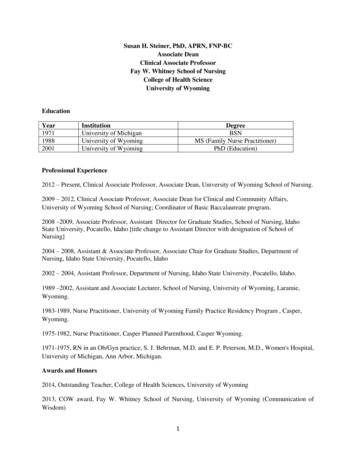
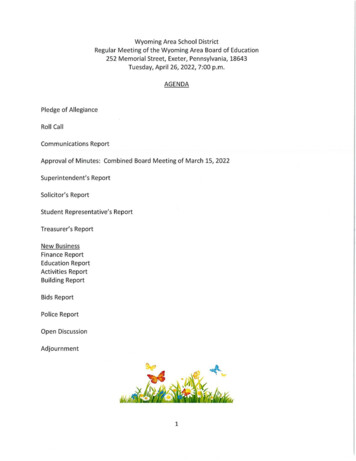

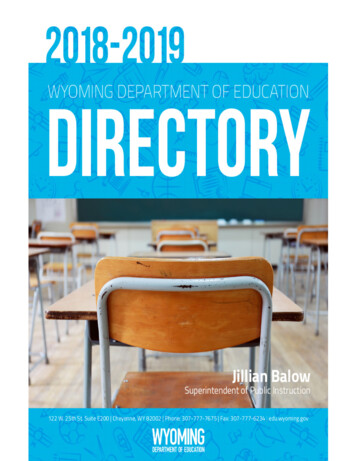
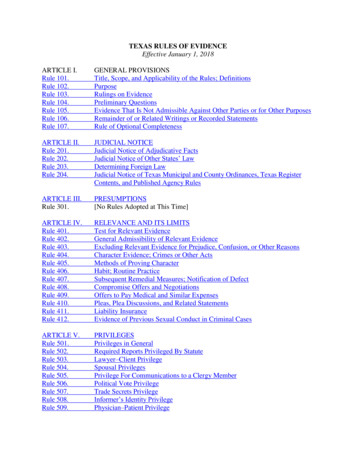
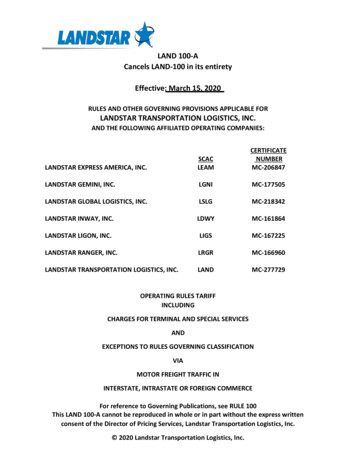
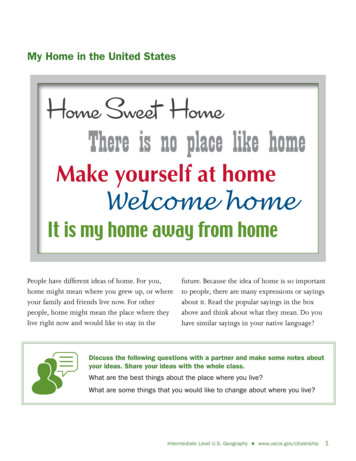
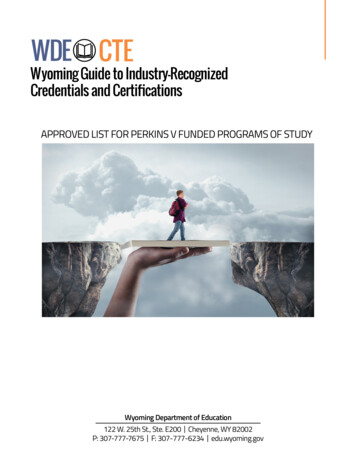
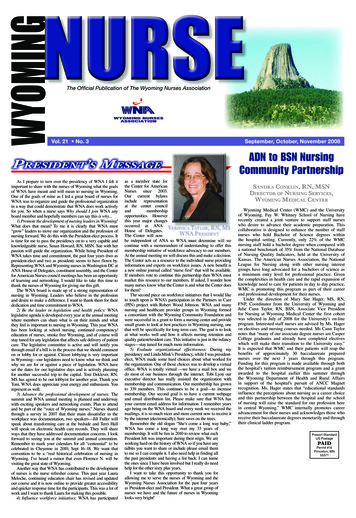
![Welcome [ wyomingworkforce ]](/img/14/program.jpg)
